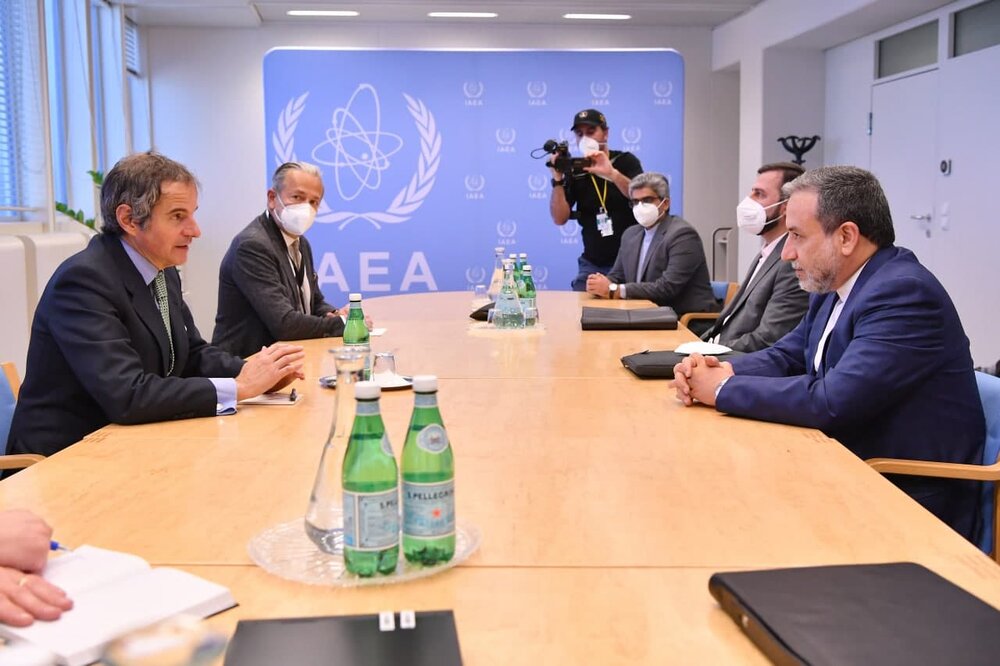Iran will extend deal with IAEA if needed, top negotiator says

TEHRAN – A top Iranian nuclear negotiator leading Iran’s negotiating team at the Vienna nuclear deal talks said Iran will extend a monitoring access deal with the UN nuclear watchdog if needed.
Iranian Deputy Foreign Minister Seyed Abbas Araghchi told Japanese broadcaster NHK that Iran hopes enough progress will be made so that there will be no need for an extension. But he said that if needed, Iran will consider an extension at a proper time.
The Iranian negotiator was referring to a February deal between Iran and the IAEA which allowed the latter to continue its monitoring access to Iranian nuclear sites ahead of the implementation of a parliamentary nuclear law obligating the Iranian government to strictly restrict cooperation with the IAEA in case the West failed to lift sanctions.
The deal was reached during a two-day visit by IAEA Director-General Mariano Grossi to Iran. During the visit, Grossi met with Ali Akbar Salehi, head of the Atomic Energy Organization of Iran (AEOI), and Iranian Foreign Minister Mohammad Javad Zarif.
“Intensive consultations led to a good result. A temporary technical understanding has been reached. The IAEA will continue its necessary verification and monitoring in Iran,” the UN nuclear watchdog chief said in a tweet following his visit to Iran.
The IAEA and the AEOI issued a joint statement outlining the content of the understanding moments after Grossi concluded his visit to Iran.
“The Atomic Energy Organization of Iran and the International Atomic Energy Agency recalled and reaffirmed the spirit of cooperation and enhanced mutual trust that led to the Joint Statement in Tehran on 26 August 2020, and the importance of continuing that cooperation and trust,” the statement said. “The AEOI informed the IAEA that in order to comply with the act passed by the Parliament of the Islamic Republic of Iran called ‘Strategic Action to Cease Actions and Protect the interest of Iranian Nation’ Iran will stop the implementation of the voluntary measures as envisaged in the JCPOA, as of 23 February 2021.”
The statement added, “In view of the above and in order for the Agency to continue its verification and monitoring activities, the AEOI and the IAEA agreed: 1. That Iran continues to implement fully and without limitation its Comprehensive Safeguards Agreement with the IAEA as before. 2. To a temporary bilateral technical understanding, compatible with the Law, whereby the IAEA will continue with its necessary verification and monitoring activities for up to 3 months (as per technical annex). 3. To keep the technical understanding under regular review to ensure it continues to achieve its purposes.”
The deal was reached only two days before Iran starts the implementation of the nuclear law.
The parliamentary law stipulates that the Iranian government should take certain nuclear measures such as raising the level of uranium enrichment to 20% and suspending the voluntary implementation of the Additional Protocol if the Western parties failed to honor their obligations under the 2015 Iran nuclear deal, formally called the Joint Comprehensive Plan of Action (JCPOA).
As the Vienna nuclear talks moved ahead, there has been speculation that the IAEA may need to discuss the extension of the February deal if no progress is made in the Vienna talks. Last week, Araghchi met with Grossi in the midst of the JCPOA talks.
“DFM @araghchi met @rafaelmgrossi today before the JCPOA JC meeting. Two sides discussed the latest developments on JCPOA revival talks and the role of the @iaeaorg as well as mutually interested issues between Iran and the Agency,” Kazem Gharibabadi, Iran’s permanent representative to the UN in Vienna, said of the meeting.
But Gharibabadi did not say if Araghchi and Grossi discussed the issue of extending the February deal. Araghchi and Grossi provided no details about their meeting.
Iran and the remaining parties to the 2015 nuclear deal held another meeting on Friday to discuss the latest developments concerning the nuclear deal. During the meeting, participants agreed to expedite talks and start working on a draft text of the final agreement to revive the nuclear deal. The Friday meeting marked the start of the fourth round of nuclear talks, which took place in the Austrian capital of Vienna within the framework of the JCPOA Joint Commission.
Araghchi issued a brief statement shortly after the JCPOA Joint Commission saying that during the meeting “it was decided to start expert and technical consultations and work on the draft texts immediately.”
The statement added, “All parties reaffirmed their seriousness to achieve the result in the shortest possible time.”
The Friday meeting also opened a new round of talks, according to Mikhail Ulyanov, who serves as the head of the Russian delegation to the Vienna talks.
“The Joint Commission of JCPOA at its meeting today opened a new round of the talks on full restoration of the nuclear deal. The participants agreed on the need to intensify the process. The delegations seem to be ready to stay in Vienna as long as necessary to achieve the goal,” Ulyanov said on Twitter.
Leave a Comment